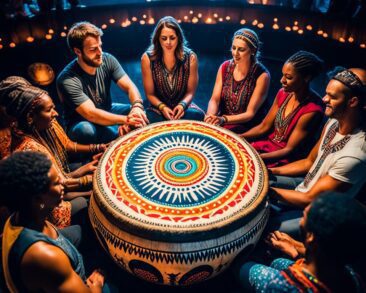African Drum Circles
In the soulful rhythms of the African drum circles, there’s a vibrant pulse that breathes life and harmony into the depths of your being. In this intriguing exploration, “The Healing Significance of African Drum Circles,” you’ll journey into the heart of these age-old musical gatherings and uncover their potential to inspire profound healing. The cadences and harmonies that emanate from these drums echo the rhythms of nature, evoking a profound sense of connection and well-being. Uncover how drum circles have been used over centuries as an effective therapy, nurturing community bonds, reducing stress, and ultimately healing the spirit.

Understanding African Drum Circles
Defining drum circles
In essence, a drum circle is a group of individuals participating in a spontaneous percussion session. African drum circles, specifically, are deeply rooted in the continent’s cultural fabric, combining rhythmic beats, communal bonds, and often spiritual undertones. Participants arrange themselves into a physical circle, symbolizing unity and equality, and use a variety of drums and percussive musical instruments to create an inclusive and harmonious soundscape.
Origins and history of African drumming
African drumming can be traced back to ancient civilizations where it played a vital role in community gatherings, rituals, and communication. Every tribe had its own distinct drumming styles, techniques, and rhythms that were passed down through generations. These traditions have survived centuries and continue to be a significant part of African heritage and storytelling.
Traditional settings and uses of drum circles
Traditionally, African drum circles were used in various settings such as communal gatherings, celebrations, rituals, or as a form of social communication. The rhythm of the drum circle often mirrored the heartbeat of the community, carrying the tribe’s collective emotions and messages, from joy and celebration to grief and warning signals.
Sacredness of the Drum in African Culture
The symbolism of the drum
In African cultures, the drum signifies more than just a musical instrument. It represents life and the heartbeat of the community. It’s a sacred object that signifies strength, power, and unity. The African drum is believed to embody the voice of the ancestors, connecting the physical and spiritual world.
Usage of drums in sacred ceremonies and rituals
Drums play an integral part in African religious ceremonies and rituals. From birth rites, weddings, ancestral worship, to funerals, the drum’s resonating beat acts as a guide, leading devotees through the ceremony’s spiritual journey.
The drum as a communication tool
Far beyond its musical role, the drum served as an essential communication tool within and between tribes. Distinct drum rhythms, patterns, and sequences were used to convey different messages such as announcements, warnings, or calls for gatherings, transcending language boundaries within diverse African societies.
Social Cohesion and Drum Circles
Fostering community spirit and togetherness
Drum circles have always fostered a sense of unity amongst participants. By participating in a drum circle, individuals become part of a collective rhythm, resulting in a profound bonding experience that strengthens community ties.
Breaking barriers and transcending differences
Drumming in a circle is an all-inclusive event that invites participants of different ages, sexes, and social statuses. It transcends social, cultural, or language barriers, embracing diversity and promoting mutual understanding and respect amongst participants.
Reinforcing societal norms and behaviours
Drum circles also served a bigger purpose of imparting societal norms and values. The cyclical patterns of drumbeats often symbolized the cycles of life, growth, and community, reinforcing the societal structures, roles, and behaviours through these metaphorical renditions.
Psychological Impacts of Drum Circles
Stress management and relaxation
The rhythmic pattern of drumming can have a calming effect, providing an outlet for emotional expression and release. This helps in stress management and promotes a sense of relaxation and tranquility.
Promotion of personal expression
Drumming offers individuals a mode of self-expression. It encourages participants to channel their emotions and thoughts through their drumming, resulting in a therapeutic musical dialogue which bolsters emotional well-being.
Boosting self-esteem and self-awareness
Through the communal nature of drum circles, they can help boost the self-esteem of participants. As each player contributes to the overall rhythm of the circle, they are given an opportunity to gain self-awareness and connect with their inner selves, fostering a sense of self-worth and acceptance.

Physiological Healing Properties of Drumming
Impact on the immune system
Research suggests that drumming can boost the immune system. The vibrational energy produced by drumming stimulates the body’s cells, potentially improving immune response and promoting physical healing.
Effect on brain wave activity
Drumming has been found to affect brainwave activity, facilitating a shift from normal waking consciousness to a more relaxed or meditative state. This shift can act as a pathway to deeper self-awareness and consciousness, promoting mental well-being.
Induces ‘state of flow’ and its benefits
Getting into the ‘state of flow’ through drumming can enhance creativity, focus, and overall mental performance. It’s rhythm, when fully absorbed in, allows individuals to lose themselves in the session, leading to a more profound sense of enjoyment and satisfaction, contributing to personal growth and happiness.
Immaterial Aspects of Healing
Role in spiritual healing
For many African cultures, drum circles aren’t just about music; they’re also about spiritual healing. The drum, acting as a bridge between the physical and spiritual realms, facilitates spiritual realignment and connection with divine energies.
Connection with the ancestors and divine
In many African traditions, the drum is seen as a link to the ancestors and the divine, with drumming sessions believed to summon ancestral spirits and divine blessings. This connection provides a sense of comfort and healing for participants on a spiritual level.
Harnessing the energy of the group for individual healing
The energy created in a drum circle can be harnessed for individual healing. When the group plays in harmony, participants often report experiencing a heightened level of energy, leading to an invigorating and healing effect.
Music Therapy and Drum Circles
Fundamentals of music therapy
Music therapy utilizes music elements – rhythm, melody, tempo, and harmonies, to facilitate healing and promote well-being. It provides an emotional outlet, helping to alleviate stress and anxiety, and foster positive interactions.
Drum circles in a therapeutic context
In therapeutic settings, drum circles cater to a wide range of individuals, from those suffering from mental health issues to ones who have faced physical trauma. Drum circles provide them an opportunity to express themselves freely and experience the healing and unifying power of rhythm.
Empirical proofs of drumming’s therapeutic effect
Numerous scientific studies have shown beneficial effects of drumming, which include stress reduction, increased positive mood, and improved social interactions. The therapeutic potential of drumming extends from mental health to physiological improvement.
Drum Circles and Trauma Healing
Drumming as a coping mechanism
For individuals dealing with trauma, drumming can be a powerful coping mechanism. It provides a non-verbal, creative outlet for self-expression and emotional release, serving as a transformative tool for trauma healing.
Collective trauma healing through shared rhythmic experiences
The collective nature of drumming enables shared experiences, making it an effective tool in healing communal or collective trauma. Through shared rhythmic experiences, communities can express collective pain, grieve, heal, and build resilience together.
Case studies of drum circles in post-war or conflict zones
In several post-conflict zones worldwide, drum circles have been used as a tool to mend community ties and heal collective trauma. The rhythmic, collective activity provides a sense of unity and peace, aiding the healing process of individuals and communities alike.
Challenges and Criticisms of Drum Circle Healing
Ethical considerations and cultural appropriation
While drum circles are globally gaining popularity, it’s essential to consider cultural sensitivities. Misunderstanding or misrepresenting the cultural significance of African drum circles may lead to accusations of cultural appropriation.
Potential for over-commercialization
The growing popularity of drum circles can lead to over-commercialization, potentially diluting their cultural significance. This could also pave the way for exploitative practices and harm the indigenous communities central to these traditions.
Limits and misconceptions about the healing power of drumming
While the therapeutic benefits of drumming are considerable, it’s important not to oversimplify or overstate them. Drumming may aid the healing process, but it should not be seen as an alternative to medical treatment or therapy.
Modern Adaptations and Future of Drum Circicles
Emergence of global drum circle movement
The therapeutic power and community-building potential of drum circles have sparked a worldwide drum circle movement. These circles, inspired by African traditions, are increasingly embraced in various parts of the globe for their cultural, therapeutic, and social benefits.
Integration into modern healing and health practices
Today, the integration of drum circles into modern healing practices is proving to be a promising development. From psychotherapy sessions to occupational therapy, the drum circle’s rhythmic and communal nature is adding a new dimension to health and healing practices.
Potential future research and developments in drumming therapy
Looking ahead, there’s a need for more comprehensive and in-depth research into the therapeutic potentials of drum circles. Further developments in drumming therapy, guided by well-designed studies, could contribute significantly to our understanding and application of this form of therapy, making it accessible to a wider audience in varied therapeutic contexts. In conclusion, African drum circles, steeped in rich tradition and cultural significance, have evolved from their traditional tribal origins to a globally recognized therapeutic instrument, promoting healing, unity, and well-being. While challenges and criticisms must be considered, the future of drum circles holds immense potential.
